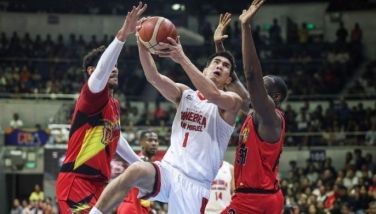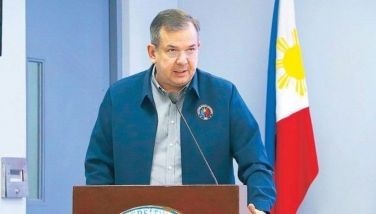Colors of strife
May 12, 2003 | 12:00am
A strange thing about last Saturday’s piece came to the attention of this writer as it went to print. There seemed to be something in common among all the NBA personalities who were initially reported to be involved in NBA-TV’s SARS fund-raising telecast headed by Yao Ming.
On the surface, what could Steve Francis, Derek Fisher, 2003 MVP Tim Duncan, Steve Nash, Dirk Nowitzki, Dikembe Mutombo, Chris Webber, Vlade Divac, Peja Stojakovic, Phil Jackson, Bill Walton, Earl Monroe, Kevin McHale, John Havlicek, Richard Jefferson, David Robinson and NBA Commissioner David Stern possibly have in common other than basketball?
But take a closer look, and you’ll see that most of these luminaries have also travelled very hard roads to the zenith of their profession. Stojakovic, a native of Serbia and Montenegro (and the Sacramento Kings’ second-leading scorer next to Webber) knows about civil unrest and domestic strife. Peja knows about living with the constant presence of gunfire, and never knowing which of today’s friends will turn out to be one of tomorrow’s enemies. In fact, even his friendship with teammate (and fellow Serb) Divac has been strained at times because of civil unrest in their part of the world.
Nowitzki was a soldier in the German military, and experienced even worse discomfort than other infantrymen simply because of his size. His feet would stick out of tents, and his uniforms never fit. He escaped prolonged tenure because of his extraordinary size and basketball skill. Robinson was the same. Once a pillar of strength for Navy, the Admiral simply ourgrew the 6-8 height limit for submarine duty. He was too big for the service, but he knew all about the realities of war.
Monroe and Stern both grew up in New York, and experienced firsthand the racial biases in the land of the free. New York was the entry point of immigrants from before the turn of the 20th century through the Depression and today. They felt the harsh lash of racial slurs and riots. New York was also a stronghold for the vocal African-American intelligentsia that raised its voice in unison with Malcolm X, and a hotbed for Jews who fled Hitler’s death camps and ovens to fight a new struggle for acceptance in America.
Jackson and Walton were the same, only they expressed their generation’s disillusionment with established authority through their lifestyle and personal appearances. But they were witnesses to the battle between the government and those who pushed the envelope of freedom of speech. And they didn’t hide their true sentiments, either.
Mutombo likewise feels truly blessed. He studied at Georgetown, and is building a hospital in his native Africa to save lives of people who’ve been dying from lack of the most basic medical facilities.
The other players on that list had to survive criticism of their ability, underestimation of their size, or adversity in their environment as children, before finally becoming established performers in the NBA.
So what am I saying here? All these people can sympathize with Yao Ming, whose country is being ravaged by SARS. I was surprised that Nash wasn’t likewise giving a telethon, considering that Canada has reported numerous casualties from the disease. They have all experienced harshness in their societies, wherein a normal, day-to-day life seems impossible without fear of violence or disease or unemployment or some other bolt from the heavens striking you down.
So where were the league’s other stars? Was Duncan nominated some sort of ambassador for them, being the reigning MVP? Or do many of the league’s youngsters live in ivory towers, conveniently forgetting their own painful suburban upbringing?
It will probably be difficult explaining crippling epidemics or civil war with twenty-something millionaires who try to maintain the "gangsta" in them without much bite. Really, how "street" is a custom Rolls or Escalade with rims and a dozen speakers and a drop down flat-screen TV? And how can they feel the pain of others when they’re so thoroughly insulated by managers, bodyguards, hangers-on and other members of their "posse?"
Perhaps the NBA should try to bridge the gap. It has many worthy programs for social awareness, and each team is actively involved in measures to improve and promote reading, eradicate homelessness and even keep kids in school and away from drugs. But maybe they should expand their searchlight to problems of disease, terrorism and other new ills.
We don’t mean to send these young men off to war. But whether they like it or not, as public figures, they have a larger responsibility to know what goes on in their expanded world. Maybe then they can know what it really means to make a difference.
On the surface, what could Steve Francis, Derek Fisher, 2003 MVP Tim Duncan, Steve Nash, Dirk Nowitzki, Dikembe Mutombo, Chris Webber, Vlade Divac, Peja Stojakovic, Phil Jackson, Bill Walton, Earl Monroe, Kevin McHale, John Havlicek, Richard Jefferson, David Robinson and NBA Commissioner David Stern possibly have in common other than basketball?
But take a closer look, and you’ll see that most of these luminaries have also travelled very hard roads to the zenith of their profession. Stojakovic, a native of Serbia and Montenegro (and the Sacramento Kings’ second-leading scorer next to Webber) knows about civil unrest and domestic strife. Peja knows about living with the constant presence of gunfire, and never knowing which of today’s friends will turn out to be one of tomorrow’s enemies. In fact, even his friendship with teammate (and fellow Serb) Divac has been strained at times because of civil unrest in their part of the world.
Nowitzki was a soldier in the German military, and experienced even worse discomfort than other infantrymen simply because of his size. His feet would stick out of tents, and his uniforms never fit. He escaped prolonged tenure because of his extraordinary size and basketball skill. Robinson was the same. Once a pillar of strength for Navy, the Admiral simply ourgrew the 6-8 height limit for submarine duty. He was too big for the service, but he knew all about the realities of war.
Monroe and Stern both grew up in New York, and experienced firsthand the racial biases in the land of the free. New York was the entry point of immigrants from before the turn of the 20th century through the Depression and today. They felt the harsh lash of racial slurs and riots. New York was also a stronghold for the vocal African-American intelligentsia that raised its voice in unison with Malcolm X, and a hotbed for Jews who fled Hitler’s death camps and ovens to fight a new struggle for acceptance in America.
Jackson and Walton were the same, only they expressed their generation’s disillusionment with established authority through their lifestyle and personal appearances. But they were witnesses to the battle between the government and those who pushed the envelope of freedom of speech. And they didn’t hide their true sentiments, either.
Mutombo likewise feels truly blessed. He studied at Georgetown, and is building a hospital in his native Africa to save lives of people who’ve been dying from lack of the most basic medical facilities.
The other players on that list had to survive criticism of their ability, underestimation of their size, or adversity in their environment as children, before finally becoming established performers in the NBA.
So what am I saying here? All these people can sympathize with Yao Ming, whose country is being ravaged by SARS. I was surprised that Nash wasn’t likewise giving a telethon, considering that Canada has reported numerous casualties from the disease. They have all experienced harshness in their societies, wherein a normal, day-to-day life seems impossible without fear of violence or disease or unemployment or some other bolt from the heavens striking you down.
So where were the league’s other stars? Was Duncan nominated some sort of ambassador for them, being the reigning MVP? Or do many of the league’s youngsters live in ivory towers, conveniently forgetting their own painful suburban upbringing?
It will probably be difficult explaining crippling epidemics or civil war with twenty-something millionaires who try to maintain the "gangsta" in them without much bite. Really, how "street" is a custom Rolls or Escalade with rims and a dozen speakers and a drop down flat-screen TV? And how can they feel the pain of others when they’re so thoroughly insulated by managers, bodyguards, hangers-on and other members of their "posse?"
Perhaps the NBA should try to bridge the gap. It has many worthy programs for social awareness, and each team is actively involved in measures to improve and promote reading, eradicate homelessness and even keep kids in school and away from drugs. But maybe they should expand their searchlight to problems of disease, terrorism and other new ills.
We don’t mean to send these young men off to war. But whether they like it or not, as public figures, they have a larger responsibility to know what goes on in their expanded world. Maybe then they can know what it really means to make a difference.
BrandSpace Articles
<
>
- Latest
- Trending
Trending
Latest
Trending
Latest
Recommended





























